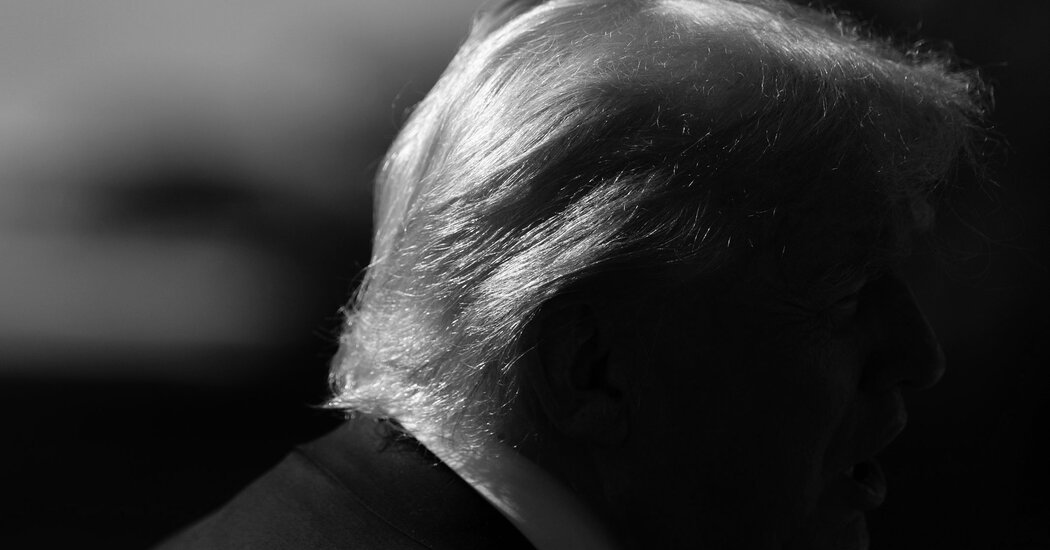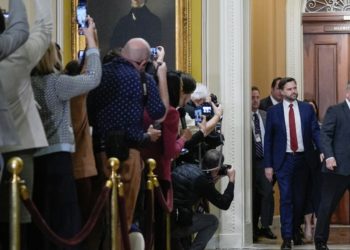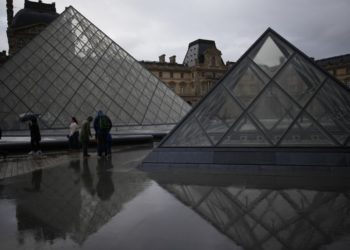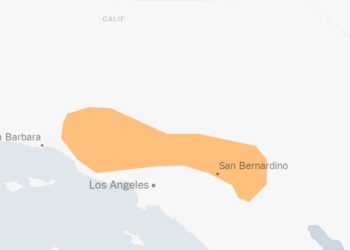One of the observations people make about President Trump, especially those who have borne the brunt of his attacks, is that he reminds them of a mafia don.
In his 2018 book, “A Higher Loyalty,” James Comey, a former director of the F.B.I., described a demand Trump made of him at a private dinner: “I need loyalty. I expect loyalty.”
“The demand,” Comey wrote, “was like Sammy the Bull’s Cosa Nostra induction ceremony” — a reference to Salvatore Gravano, a former Gambino crime family underboss.
More recently, Chris Christie, a former New Jersey governor and U.S. attorney, told ABC News that under Trump, “the Department of Justice is no longer the premier prosecuting office in America. What it is now is a caporegime who goes out and executes hits when directed by the don to do so. That’s what it is.”
I decided to take this idea seriously and asked a range of experts in criminal organizations, mafias and other illicit groups to compare and contrast the way the Trump administration operates with the way these other groups operate.
Some of the things I was wondering about: Does Trump have the courage, guts and audacity to qualify as a boss or a capo di tutti capi? Or does his demeaning subservience to, say, President Vladimir Putin of Russia disqualify him?
Who would be Trump’s underboss? Stephen Miller, deputy chief of staff for policy and homeland security, Vice President JD Vance or Russell Vought, the director of the Office of Management and Budget?
Vance seems to pale in comparison with Miller and Vought.
But perhaps Vought would be more appropriate in the role of consigliere, although he might have competition from Pam Bondi, the attorney general, for that position.
There are plenty of candidates for spots in middle management.
High on the list: Ed Martin, whose nomination to be U.S. attorney for the District of Columbia was so widely opposed that he could not win approval from the Republican-controlled Senate. What better recommendation could a hard man ask for?
Martin was then appointed pardon attorney and director of the Interagency Weaponization Working Group of the Department of Justice, posts that do not require confirmation. The working group’s name may sound bureaucratic, but its mission is to make sure Trump’s revenge fantasies come to fruition.
Martin likes to make threats, like this one to Trump’s adversaries, made during a news conference on May 13:
There are some really bad actors, some people that did some really bad things to the American people. And if they can be charged, we’ll charge them. But if they can’t be charged, we will name them, and we will name them. And in a culture that respects shame, they should be people that are shamed.
Equally qualified: Tom Homan, Trump’s border czar. On Sept. 8 Homan warned anti-ICE demonstrators on Fox News:
If you cross that line, throw a stone, you go into jail. You put your hands on an ICE officer, you’re going to jail. You make a threat, either online or in person, you’re going to jail. And President Trump has made it clear to me over a month ago, zero tolerance, you cross that line and move from a protester to a criminal.
Brendan Carr, chairman of the Federal Communications Commission, falls a notch below Martin and Homan in the Trump hierarchy, but his warning to ABC when Carr pressured the network last month to drop Jimmy Kimmel sounded like classic mob talk, at least the way mobsters speak in movies: “We can do this the easy way or the hard way.”
There is, of course, at least one big difference between the Trump administration and the mafia’s criminal extortion tactics: Criminals back up their demands with a credible threat of violence; the Trump administration backs up its demands using the power of government to defund, bankrupt and regulate out of existence its adversaries and the defiant, although of course it has also begun to deploy military and paramilitary forces in unusual ways.
Some of the experts I queried who questioned the legitimacy of comparing the Trump administration to the mafia did so for reasons that were not complimentary of Trump.
Diego Gambetta, who holds a chair in social and political science at Collegio Carlo Alberto in Turin, Italy, and is an emeritus fellow of Nuffield College, Oxford, wrote by email responding to my queries: “What I know about the Sicilian mafia and the little I know of the current U.S. administration’s organization and hierarchy suggests it would be hard to find points of meaningful comparison.”
Sicilian mafias, according to Gambetta, “live at the margin and mistakes and blunders are costly for them and their confreres, so recruits are chosen carefully and their competence seriously evaluated before being initiated.”
TACO (“Trump Always Chickens Out”), Gambetta continued, “is not an option for them, as being intimidating is a key part of their job as their verdicts and decisions must be respected. And they pride themselves for respecting their promises, as men of honor do.”
In February 2019. Gambetta told Vice that Trump and mafia bosses are opposites in their public behavior. Mafia bosses, he said,
do not talk much at all. They measure their words with great care. They do not gesticulate or pull faces. They do not boast. They do not, except in the most exceptional circumstances, display their visceral feelings.
The little information they pass to one another tends to be accurate, and they certainly do not cheaply resort to insulting and offending people or issuing crass threats. They are professional in intimidation. They are not cardboard gangsters.
For that matter, what mafia don would ever post on X an A.I.-created video of himself flying over a city dropping what appear to be feces on protesters?
From a different perspective, Danilo Mandic, a lecturer in sociology at Harvard and the author of “Gangsters and Other Statesmen: Mafias, Separatists and Torn States in a Globalized World,” made the case in a phone conversation that Trump and mafia dons share a crucial ingredient of leadership: patrimonialism, a theory first explored in detail by the sociologist Max Weber:
You have one personality around whom these patron client relations are built. So I give you employment, and you give your loyalty to me, or I give you some resource, and you give your loyalty to me. Scratch my back. I scratch your back. These are personalistic regimes.
Contrary to the popular image of mafia leaders, Mandic argued,
They’re not just kind of evil, criminal, psychopathic types. They are a certain kind of moral order. They pretend to stand for something — not pretend, but they do stand for something. These mafiosos think of themselves as very moral religious characters. In Sicily, for example, they have a traditionalism to them, and they have a certain moral code to them, and they see themselves as kind of guardians of the morality of the community.
In this context, Mandic contended there is a parallel to Trump’s leadership of the MAGA movement:
Whatever we may think about his personal cynicism, Trump wouldn’t have been able to build such a movement were there not a very serious moral narrative about a return to a golden age of America that was lost, right?
Trump, he continued, offers his supporters
protection against the ravages of global trade, protection against the kind of hipsters from the East Coast, the East Coast elites that have stolen your identity and stolen your culture and stolen your race.
In some crazy way, Trump is signaling a certain kind of racial integrity that was lost, or that is under assault, or that is being sold out by the corporate globalist elites.
Miller, one of Trump’s most outspoken loyalists, captured the sense of moral righteousness underpinning the MAGA movement in his Sept. 21 speech at the memorial for Charlie Kirk in Phoenix:
You have no idea the dragon you have awakened. You have no idea how determined we will be to save this civilization, to save the West, to save this republic, because our children are strong and our grandchildren will be strong, and our children’s children’s children will be strong.
And what will you leave behind? Nothing, nothing. To our enemies: You have nothing to give. You have nothing to offer. You have nothing to share but bitterness. We have beauty, we have light, we have goodness, we have determination, we have vision, we have strength. We built the world that we inhabit now, generation by generation, and we will defend this world. We will defend goodness. We will defend light, we will defend virtue. You cannot terrify us. You cannot frighten us. You cannot threaten us, because we are on the side of goodness. We are on the side of God.
The scholars I queried focused on the overarching similarities between the Trump administration and different types of criminal syndicates, their rules of membership, their longevity, their styles of leadership. Others argued that there were a number of clear differences between the Trump administration and the organizational characteristics of major crime syndicates.
In an email, Letizia Paoli, a professor of criminology at the University of Leuven Faculty of Law, in Belgium, explored some of these difference based on her study of “five iconic mafias: the Calabrian ‘Ndrangheta, Chinese triads, Japanese yakuza, and the Sicilian and American Cosa Nostras.”
Paoli found “seven common traits of mafia organizations,” most of which are not present in the Trump administration. The common traits, she wrote, are:
-
Longevity. The five iconic mafias have all existed for at least a century, with the triads and yakuza going back to the 17th and 18th centuries, respectively.
-
Large size. All five mafias have in their histories had at least a few thousand members for several decades. The triads and yakuza had more than 230,000 and 180,000 members, respectively, at their peaks.
-
Formalized and complex structure. Each of the five mafias consists of one or more consortia of associated groups and has formalized and complex internal hierarchies. They have ruling bodies within each group and often also across the groups that make up the consortia.
-
Elaborate cultural apparatus. Mafia organizations possess a complex set of cultural codes, rituals, norms and sanctions through which they create a collective identity, justify their existence and aim to generate a lifelong commitment, a new identity and fictive kinship ties among their members.
-
Multifunctionality. Throughout their existence mafias have carried out a variety of functions, aiming at both money and power, engaging in numerous illegal and legal activities and usually granting their members considerable autonomy in their moneymaking activities.
-
The goal of political dominion and longstanding ability to provide governance services. Mafia organizations are different from illegal enterprises and from other criminal organizations because they claim to exercise a local political dominion that extends beyond their members and collaborators.
-
Popular legitimacy and power sharing. With their claim to exercise political dominion, mafias have long enjoyed a considerable degree of popular legitimacy and have entered de facto, or sometimes even official, power-sharing arrangements with local state institutions.
Paoli dismissively described the Trump administration as a “clique” that “does not clearly distinguish between insiders and outsiders” and “does not constitute a consortium, like the Cosa Nostras or the triads.” Nor does the Trump clique “have the formalized or complex internal hierarchies that were typical of mafias at the peak of their power.”
Significantly, Paoli wrote,
Trump’s clique does not possess the complex set of cultural codes, rituals, norms and sanctions through which mafias aim to create a collective identity. It does not use rituals of initiation, as all mafias do, to impose a new lifelong identity of ‘man of honor’ or to create fictive brotherhoods ties on its members.
In a succinct email, Federico Varese, a professor of criminology at Sciences Po in Paris, wrote:
I think it might be a fun game to compare the Trump gang to a mafia family, but it is a big stretch. First, mafia families have an entry ritual. Second, the mafia family is connected to other families that share the same ritual and basic rules. So there is no boss of the bosses in the mafia but a commission of (equal) bosses. Trump would be the boss of a single family, but there is no overall mafia and therefore no commission.
While it may be a stretch, I think the case can be made that the Trump administration has quietly (and often not so quietly) created a unique Americanized version of a traditional protection racket.
This past week, the media began to focus on the Weaponization Working Group in the Department of Justice, prompted in large part by the Oct. 20 publication of a Reuters investigative report, “Wide-Ranging Group of U.S. Officials Pursues Trump’s Fight Against ‘Deep State,’” by Jonathan Landay, Sarah N. Lynch and Phil Stewart.
It read, in part:
A group of dozens of officials from across the federal government, including U.S. intelligence officers, has been helping to steer President Donald Trump’s drive for retribution against his perceived enemies, according to government records and a source familiar with the effort.
The Interagency Weaponization Working Group, which has been meeting since at least May, has drawn officials from the White House, the Office of the Director of National Intelligence, the Central Intelligence Agency, the Justice and Defense Departments, the Federal Bureau of Investigation, the Department of Homeland Security, the Internal Revenue Service and the Federal Communications Commission, among other agencies, two of the documents show.
Obviously, the Weaponization Working Group does not have the power to order murders, but it does have the power to propose criminal investigations of prosecutors who investigated Trump, of former Trump aides who became vocal critics, of virtually everyone Trump has taken a dislike to.
On a larger scale, one major source of revenue for mafias of time past was protection rackets — threats to shut down businesses, to order strikes at construction sites, to disrupt the course of business at restaurants and retail stores. Trump, in turn, has, in effect, extorted millions of dollars from television networks and other businesses subject to federal regulation, withheld grants to force compliance with administration demands, demanded law firms perform millions of dollars in Trump-selected free work under threat of lost access to federal courts, conditioned aid to Ukraine on U.S. access to critical minerals — the list goes on and on.
While Trump and many of his loyalists routinely violate the tradition of keeping a low profile, they have no hesitation in living large.
For sheer chutzpah, even John Gotti would have had a tough time trying to match the purchase of two private jets by the Coast Guard on behalf of Kristi Noem, the secretary of homeland security, for $172 million.
But Noem is a piker in comparison with her boss.
Who else but Trump would have the gall to demand that the Justice Department pay him $230 million in compensation for past investigations?
And to top it off, who else but Trump could have made jaws worldwide drop in envy by pressuring foreign and domestic billionaires to buy into his cryptocurrency schemes, producing profits estimated as high as $5 billion for him and his family?
The Times is committed to publishing a diversity of letters to the editor. We’d like to hear what you think about this or any of our articles. Here are some tips. And here’s our email: [email protected].
Follow the New York Times Opinion section on Facebook, Instagram, TikTok, Bluesky, WhatsApp and Threads.
Thomas B. Edsall has been a contributor to the Times Opinion section since 2011. His column on strategic and demographic trends in American politics appears every Tuesday. He previously covered politics for The Washington Post.
The post There’s a Reason Trump Reminds His Targets of a Mafia Don appeared first on New York Times.




